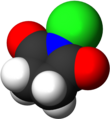| |||
| Names | |||
|---|---|---|---|
| Preferred IUPAC name 1-Chloropyrrolidine-2,5-dione | |||
| Other names Chlorosuccinimide | |||
| Identifiers | |||
| CAS Number | |||
| 3D model (JSmol) | |||
| Abbreviations | NCS | ||
| Beilstein Reference | 113915 | ||
| ChEBI | |||
| ChEMBL | |||
| ChemSpider | |||
| ECHA InfoCard | 100.004.436 | ||
| EC Number |
| ||
| Gmelin Reference | 122816 | ||
| PubChem CID | |||
| UNII | |||
| CompTox Dashboard (EPA) | |||
InChI
| |||
SMILES
| |||
| Properties | |||
| Chemical formula | C4H4ClNO2 | ||
| Molar mass | 133.53 g·mol | ||
| Appearance | white solid | ||
| Density | 1.65 g/cm | ||
| Melting point | 148 to 150 °C (298 to 302 °F; 421 to 423 K) | ||
| Hazards | |||
| GHS labelling: | |||
| Pictograms |  
| ||
| Signal word | Danger | ||
| Hazard statements | H302, H314, H319, H335, H412 | ||
| Precautionary statements | P260, P261, P264, P270, P271, P273, P280, P301+P312, P301+P330+P331, P303+P361+P353, P304+P340, P305+P351+P338, P310, P312, P321, P330, P337+P313, P363, P403+P233, P405, P501 | ||
| Related compounds | |||
| Related Imides | Succinimide N-Bromosuccinimide N-Iodosuccinimide | ||
| Except where otherwise noted, data are given for materials in their standard state (at 25 °C , 100 kPa).
| |||
N-Chlorosuccinimide (NCS) is the organic compound with the formula C2H4(CO)2NCl. This white solid is used for chlorinations. It is also used as a mild oxidant. NCS is related to succinimide, but with N-Cl in place of N-H. The N–Cl bond is highly reactive, and NCS functions as a source of "Cl".
Synthesis and selected reactions
NCS is produced from succinimide by treatment with Cl sources, such as sodium hypochlorite (bleach), and t-butylhypochlorite, and even chlorine.
Electron-rich arenes are readily monochlorinated by NCS. Aniline and mesitylene are converted to the respective chlorinated derivatives.
Related reagents
- N-Iodosuccinimide (NIS), the iodine analog of N-chlorosuccinimide.
- N-bromosuccinimide (NBS), the bromine analog of N-chlorosuccinimide.
- Other N-chloro compounds that are commercially available include chloramine-T, trichloroisocyanuric acid ((OCNCl)3), 1,3-dichloro-5,5-dimethylhydantoin.
Further reading
- Delaney, Paul A.; R. Johnstone (1985). "Solvent effects in the chlorination of tetrahydrothiophens with N-chlorosuccinimide". Tetrahedron. 41 (18): 3845–3851. doi:10.1016/S0040-4020(01)91405-X.
- N-chlorosuccinimide has been employed as chlorinating agent in combination with visible-light photoredox catalysts in organic synthesis.
References
- N-Chlorosuccinimide at Sigma-Aldrich
- ^ Golebiewski, W. Marek; Gucma, Miro slaw (2007). "Applications of N-chlorosuccinimide in organic synthesis". Synthesis (23): 3599–3619. doi:10.1055/s-2007-990871.
- Kim, Kwan Soo; I. Cho; B. Yoo; Y. Song; C. Hahn (1984). "Selective oxidation of primary and secondary alcohols using di-isopropyl sulphide–N-chlorosuccinimide". J. Chem. Soc., Chem. Commun. (12): 762–763. doi:10.1039/C39840000762.
- Beebe, T. R.; R. L. Adkins; C. C. Bogardus; B. Champney; P. S. Hii; P. Reinking; J. Shadday; W. D. Weatherford; M. W. Webb; S. W. Yates (1983). "Primary alcohol oxidation with N-iodosuccinimide". J. Org. Chem. 48 (18): 3126–3128. doi:10.1021/jo00166a046.
- Castanet, Anne-Sophie; F. Colobert; P. Broutin (2002). "Mild and regioselective iodination of electron-rich aromatics with N-iodosuccinimide and catalytic trifluoroacetic acid". Tetrahedron Lett. 43 (29): 5047–5048. doi:10.1016/S0040-4039(02)01010-9.
- Rogers, David A.; Gallegos, Jillian M.; Hopkins, Megan D.; Lignieres, Austin A.; Pitzel, Amy K.; Lamar, Angus A. (2019-09-06). "Visible-light photocatalytic activation of N-chlorosuccinimide by organic dyes for the chlorination of arenes and heteroarenes". Tetrahedron. 75 (36): 130498. doi:10.1016/j.tet.2019.130498. ISSN 0040-4020.

